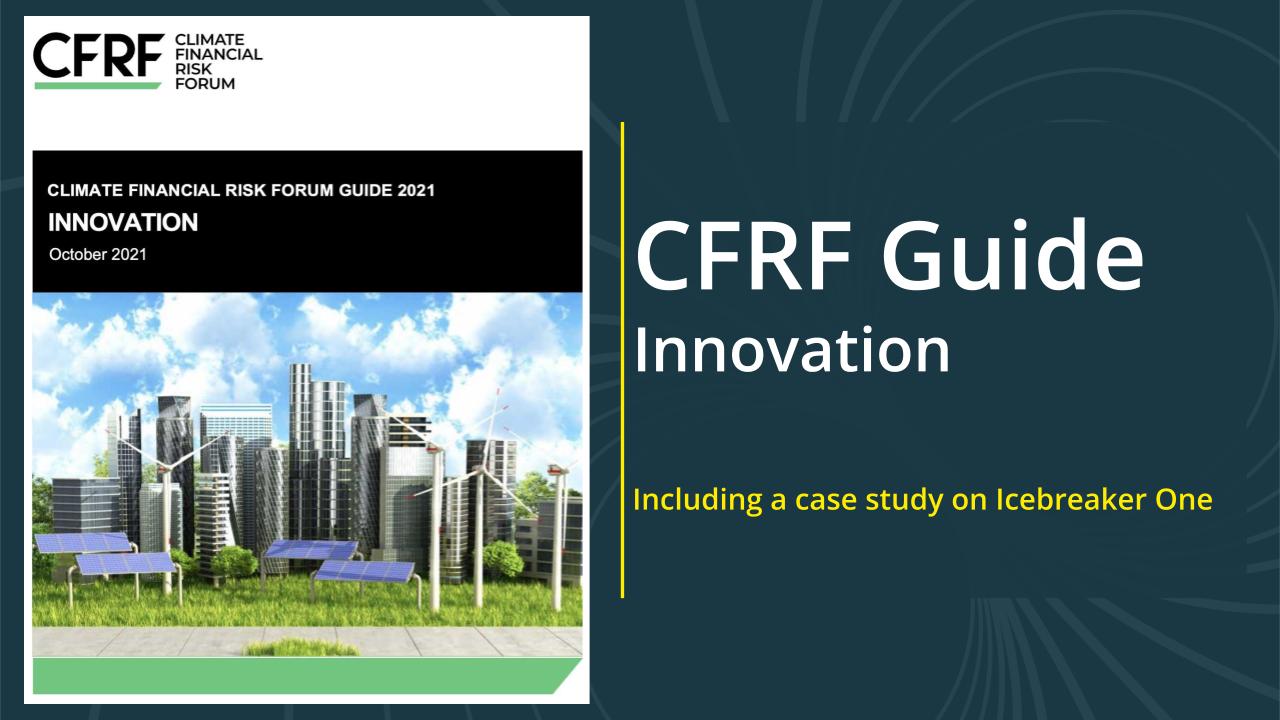More detail at: https://www.bankofengland.co.uk/climate-change/climate-financial-risk-forum
The Climate Financial Risk Forum (CFRF) is an industry forum jointly convened by the PRA and FCA to build capacity and share best practice—to advance the sector’s responses to the financial risks from climate change.
The CFRF set up four technical working groups on disclosure, scenario analysis, risk management and innovation. Icebreaker One has been participating in its Innovation track. Watch our CEO, Gavin Starks, discuss the role data sharing can play in delivering Net Zero:
To read the full forum outputs (via https://www.bankofengland.co.uk/climate-change/climate-financial-risk-forum)
On 21 October 2021 the CFRF published its second round of guides (Session 2 guides) to help the financial sector develop its approach to addressing climate-related financial risks and opportunities. These guides incorporate best practice and are written by industry, for industry. The Session 2 guides are focussed on risk management, scenario analysis, disclosure, innovation, and climate data and metrics and build on the guide that was published on 29 June 2020.
A total of ten different outputs have been published by the various working groups and are provided below:
- Risk Management – Risk Appetite Statements
- Risk Management – Use Cases
- Risk Management – Training syllabus for climate
- Scenario Analysis – Implementation Guide
- Scenario Analysis – Data and tools providers spreadsheet
- Disclosure – Case Studies
- Disclosure – Managing legal risk
- Innovation – Commentary report
- Innovation – Case study videos
- Climate Data & Metrics – Guide
Introduction from Andrew Bailey, Governor, Bank of England
For the full presentation, please view via the Bank of England website and watch the video at https://webinars.fca.org.uk/climate-financial-risk-forum/23f67ecdb84635580bde/room

There is a shared responsibility across financial institutions and regulators to help steward the real economy to net zero. While much of the focus has been on the risks to financial firms associated with physical impacts of climate change and the transition to net zero – the ‘greening finance’ agenda – the Innovation Working Group note that the opportunity and upside potential of moving to a net-zero, resilient economy tends to be
underappreciated.
• This ‘financing green’ agenda suggests the need for firms to have a capital allocation framework as well as a climate risk management framework.
• Innovation on this issue is happening at pace, through the activities of multiple firms, public agencies, and non-profits, nationally and internationally. However, to meet national and international climate targets, this innovation needs to be both actionable and scalable.
• While there are many good innovations happening, few innovations exist which will scale sufficiently to transform whole economic sectors (buildings, land use, hard-to-abate sectors, energy) to meet the necessary £50Billion/year
finance required. Pension funds provide a critical opportunity in this space.
• This will require regulators to work closely with industry to ensure regulations (e.g., prudential regulation in insurance) take the macro-risks of not addressing climate change as seriously in practice as more traditional financial risk factors.
